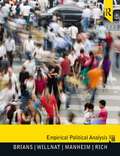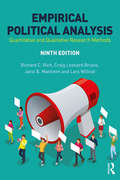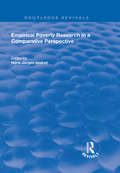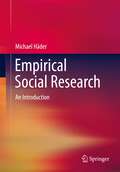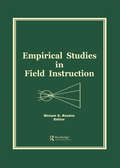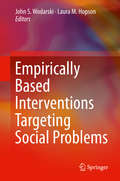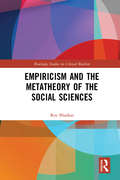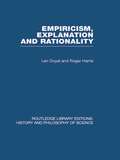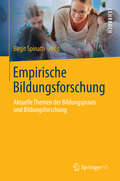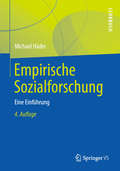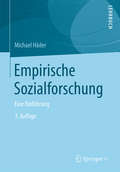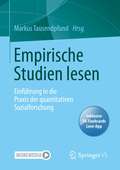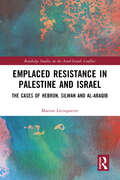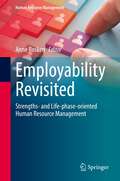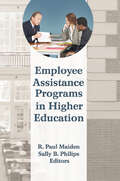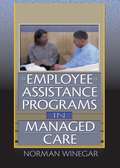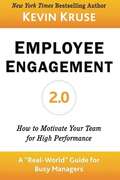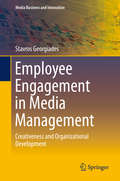- Table View
- List View
Empirical Political Analysis: Pearson New International Edition CourseSmart eTextbook
by Richard RichEmpirical Political Analysis introduces students to the full range of qualitative and quantitative methods used in political science research.Organized around all of the stages of the research process, this comprehensive text surveys designing experiments, conducting research, evaluating results, and presenting findings. With exercises in the text and in a companion lab manual, Empirical Political Analysis gives students applied insights on the scopes and methods of political science research. Features: Offers comprehensive coverage of quantitative and qualitative research methods in political science, a hallmark since it first published over 25 years ago. Covers the research process from start to finish--hypothesis formation, literature review, research design, data gathering, data analysis, and research report writing. Includes in-depth examples of political science research to give discipline-specific instruction on political analysis. Features a "Practical Research Ethics" box in every chapter to make students aware of common ethical dilemmas and potential solutions to them. Written by political scientists who actively publish in subfields ranging from comparative politics to environmental policy to political communications to voting behavior. Includes learning goals, key terms, and research examples to help students engage and explore the most important concepts.
Empirical Political Analysis: Quantitative and Qualitative Research Methods
by Craig Leonard Brians Jarol B. Manheim Richard C. Rich Lars WillnatEmpirical Political Analysis introduces readers to the foundations of social science research. Organized around the stages of the research process, this textbook prepares readers to conduct both quantitative and qualitative research, from the formation of theory through the design of research projects, to the collection of data and the analysis of results. It offers a clear and concise presentation of basic concepts and tools that can be applied in a wide range of research settings and highlights ethical conduct in the research process. It will help you both to achieve sound results in your own research and to critically evaluate research presented by others. Key features: Offers comprehensive coverage of quantitative and qualitative research methods in political science – this book is one of the key texts in the field of political research methods since it was first published over 25 years ago. Covers the research process from start to finish—hypothesis formation, literature review, research design, data gathering, data analysis, and research report writing. Includes in-depth examples of political science research to give discipline-specific instruction on political analysis. Features a "Practical Research Ethics" box in every chapter to make students aware of common ethical dilemmas and potential solutions to them. Includes learning goals, key terms, and research examples to help students engage and explore the most important concepts. New to this edition: Updated and international case studies. New material on understanding research design – what constitutes a sound research design and how this contributes to being able to justify research findings. New Companion Website material, including both quantitative and qualitative data analysis exercises.
Empirical Poverty Research in a Comparative Perspective (Routledge Revivals)
by Hans-Jürgen AndreßFirst published in 1998, this books considers defining the concept of poverty as a collective issue through an empitrical view point on an international scale. Looking to define ‘poverty’ by compiling case studies by academics writing from viewpoints in a variety of individual countries.
Empirical Social Choice
by Wulf Gaertner Erik SchokkaertSince Aristotle, many different theories of distributive justice have been proposed, by philosophers as well as social scientists. The typical approach within social choice theory is to assess these theories in an axiomatic way - most of the time the reader is confronted with abstract reasoning and logical deductions. This book shows that empirical insights are necessary if one wants to apply any theory of justice in the real world. It does so by confronting the main theories of distributive justice with data from (mostly) questionnaire experiments. The book starts with an extensive discussion on why empirical social choice makes sense and how it should be done. It then presents various experimental results relating to theories of distributive justice, including the Rawlsian equity axiom, Harsanyi's version of utilitarianism, utilitarianism with a floor, responsibility-sensitive egalitarianism, the claims problem and fairness in health.
Empirical Social Research: An Introduction
by Michael HäderSocial science methods such as surveys, observations and content analyses are used in market research, studies of contemporary history, urban planning and communication research. They are all the more needed by sociologists and empirically working political scientists. Whether in the context of evaluating a prevention programme or for surveying health behaviour or for a study on social mobility, the confident handling of the social science instruments is always a prerequisite for obtaining reliable results. This book provides important information for users and developers of these instruments. It deals with the theoretical foundations of the methods, the steps in the conception and implementation of a project, the many variants of data collection, the methods to be used in the selection of study units, as well as the principles to be observed in the evaluation and documentation of the findings. With the help of numerous examples, a particularly clear presentation is achieved. In the fourth, updated edition, river sampling has now been included in the selection process, digital methods are increasingly presented and, against the background of the new data protection regulation, research ethics and data protection are also updated.
Empirical Studies in Field Instruction
by Miriam S RaskinThis landmark volume tackles the long overdue critical examination and evaluation of the state of the art of field instruction in social work education. For the first time, the findings of empirical research are consolidated to review, test, and question prevailing assumptions in social work field instruction. The vigorous assessment of the state of the art in field instruction, the field placement process, field instructors, and students enables the social work profession to reflect upon its accomplishments and review its practices. Provocative, informative, and controversial, Empirical Studies in Field Instruction also urges the profession to make changes and to insist on continued high caliber empirical research efforts in field instruction. It is an excellent resource for directors of field instruction, faculty field liaisons, field instructors, social work students, classroom instructors, researchers, and doctoral students.
Empirically Based Interventions Targeting Social Problems
by John S. Wodarski Laura M. HopsonThis unique volume demonstrates the effectiveness of applying an evidence-based practice process to the solution of selected social problems. It focuses on social work interventions addressing family, community, and societal factors. Research indicates that reinforcement for positive behavior at the group, organizational, and community levels, as opposed to interventions focusing on the individual, are more likely to result in meaningful improvement in well-being. Chapters address issues such as child maltreatment, educationally disadvantaged children, violence in schools, adolescent sexuality, substance abuse, crime, urban decline and homelessness, unemployment, marital conflict, and chronic medical problems.Empirically Based Interventions Targeting Social Problems is a relevant resource for practitioners and counseling professionals whose work involves interventions with children and families as well as communities. It also is a useful text for graduate students in social work as well as students preparing for other helping professions including psychology, sociology, marital and family counseling, and child development.
Empiricism and the Metatheory of the Social Sciences (Routledge Studies in Critical Realism)
by Roy BhaskarA picture has indeed held modern Western philosophy captive, that of the universe as a vast machine whose iron laws are best understood as exceptionless empirical regularities which, as it were, determine the future before it happens. This fantastic conception commands the assent, not just of positivistically-minded naturalists but of all the great anti-naturalists who champion a very different view of human action as a domain of freedom ‘that somehow cheats science’. The most fundamental move in Roy Bhaskar’s system of philosophy, the germ of everything that followed, was to reconceptualise the natural world in transcendental realist terms, ‘turning Kant around using his own method’. On this account, the universe is characterized by deep structures, mechanisms and fields that generate the flux of phenomena, and is in open, creative and emergent process. This completely recasts the terms of the debate between naturalism and anti-naturalism by remedying its false grounds and shows how philosophy can be liberated from its anthropocentric/anthropomorphic prison and rendered consistent with the best insights of modern natural science. There is necessity in nature quite independent of humans, but in an open world causation is multiple and conjunctural, the actual course of the unfolding of being is highly contingent and the bases of human freedom can be understood scientifically. Written as a DPhil thesis when Bhaskar was in his mid-twenties, Empiricism and the Metatheory of the Social Sciences brilliantly launches this reconceptualisation and explores its implications for social science in the course of carrying through the metatheoretical destruction of empiricism. It will be indispensable reading for anyone interested in the development of Bhaskar’s thought, in transcendental realism, and in the critique of empiricism, more generally of the philosophical discourse of Western modernity.
Empiricism, Explanation and Rationality: An Introduction to the Philosophy of the Social Sciences (Routledge Library Editions: History & Philosophy of Science)
by Len & Doyal & HarrisOriginally published in 1986. All students of social science must confront a number of important philosophical issues. This introduction to the philosophy of the social sciences provides coherent answers to questions about empiricism, explanation and rationality. It evaluates contemporary writings on the subject which can be as difficult as they are important to understand. Each chapter has an annotated bibliography to enable students to pursue the issues raised and to assess for themselves the arguments of the authors.
Empirische Befunde zur Interkulturalität bei einem Automobilkonzern: Eine kompetenzorientierte Perspektive
by Sarah de Carvalho HartmannIn diesem Buch wird das Verständnis von Interkulturalität und interkultureller Kompetenz bei einem Automobilkonzern erforscht. Dafür wurden Experteninterviews mit Führungskräften des gehobenen Managements durchgeführt. Die Interviews wurden mit der Qualitativen Inhaltsanalyse nach Udo Kuckartz und der Objektiven Hermeneutik nach Ulrich Oevermann ausgewertet. Die Ergebnisse der vorliegenden qualitativ-empirischen Studie zeigen, dass Interkulturalität und interkulturelle Kompetenz innerhalb des Organisationskontextes vom Führungspersonal unterschiedlich ausgelegt und gehandhabt werden. Aus dem empirischen Material wird in Fallanalysen und -vergleichen eine qualitative Typologie mit vier kulturbezogenen Grundorientierungen herausgearbeitet.
Empirische Bildungsforschung
by Birgit SpinathSind Jungen die neuen Bildungsverlierer? Werden die Deutschen immer dümmer? Hat PISA die Schulen besser gemacht?Entscheiden sich die Richtigen für ein Lehramtsstudium? Diese und weitere Themen sind gesellschaftlich hoch relevant. Täglich berichten Medien über Bildung - mal mehr, mal weniger fundiert. Oft wird dabei ein überpointiertes, verzerrtes Bild gezeichnet, so dass es schwer ist, sich eine eigene Meinung zu bilden. Das vorliegende Buch greift aktuelle Themen aus Bildungsforschung und Bildungspraxis auf und stellt in kurzer, übersichtlicher Form den Forschungsstand dar. Sie lernen nicht nur die Fakten, sondern auch die Personen kennen, die sich diesen Fragen in Forschung und Praxis widmen. Zu diesem Zweck wurden Interviews mit Expertinnen und Experten geführt, die in diesem Buch nachzulesen sind, aber auch als Videos angeschaut werden können. Zu Wort kommen führende Bildungsforscherinnen und -forscher aus Psychologie, Erziehungswissenschaft, Soziologie und Bildungsökonomie. Zielgruppe Das Buch kann von allen mit Gewinn gelesen werden, die sich für Bildung interessieren. Studierende verschiedener Fachrichtungen, Referendarinnen und Referendare sowie Lehrerinnen und Lehrer finden in diesem Buch viele Themen, die ihre Arbeit direkt betreffen. Die Lektüre kann auch Grundlage für eine Seminargestaltung in Fächern sein, die sich mit Bildungsforschung beschäftigen (Psychologie, Erziehungswissenschaft, Soziologie, Bildungsökonomie, Empirische Bildungsforschung etc. ). Durch den Interview-Stil ist das Buch angenehm zu lesen und daher auch als Freizeitlektüre geeignet.
Empirische Bildungsforschung: Aktuelle Themen der Bildungspraxis und Bildungsforschung (Meet the Expert: Wissen aus erster Hand)
by Birgit SpinathSind Jungen die neuen Bildungsverlierer? Werden die Deutschen immer dümmer? Hat PISA die Schulen besser gemacht?Entscheiden sich die Richtigen für ein Lehramtsstudium?Diese und weitere Themen sind gesellschaftlich hoch relevant. Täglich berichten Medien über Bildung - mal mehr, mal weniger fundiert. Oft wird dabei ein überpointiertes, verzerrtes Bild gezeichnet, so dass es schwer ist, sich eine eigene Meinung zu bilden. Das vorliegende Buch greift aktuelle Themen aus Bildungsforschung und Bildungspraxis auf und stellt in kurzer, übersichtlicher Form den Forschungsstand dar. Sie lernen nicht nur die Fakten, sondern auch die Personen kennen, die sich diesen Fragen in Forschung und Praxis widmen. Zu diesem Zweck wurden Interviews mit Expertinnen und Experten geführt, die in diesem Buch nachzulesen sind, aber auch als Videos angeschaut werden können. Zu Wort kommen führende Bildungsforscherinnen und –forscher aus Psychologie, Erziehungswissenschaft, Soziologie und Bildungsökonomie.ZielgruppeDas Buch kann von allen mit Gewinn gelesen werden, die sich für Bildung interessieren. Studierende verschiedener Fachrichtungen, Referendarinnen und Referendare sowie Lehrerinnen und Lehrer finden in diesem Buch viele Themen, die ihre Arbeit direkt betreffen. Die Lektüre kann auch Grundlage für eine Seminargestaltung in Fächern sein, die sich mit Bildungsforschung beschäftigen (Psychologie, Erziehungswissenschaft, Soziologie, Bildungsökonomie, Empirische Bildungsforschung etc.). Durch den Interview-Stil ist das Buch angenehm zu lesen und daher auch als Freizeitlektüre geeignet.
Empirische Bildungsforschung: Aktuelle Themen der Bildungspraxis und Bildungsforschung (Meet the Expert: Wissen aus erster Hand)
by Birgit SpinathSind Jungen die neuen Bildungsverlierer? Werden die Deutschen immer dümmer? Hat PISA die Schulen besser gemacht?Entscheiden sich die Richtigen für ein Lehramtsstudium?Diese und weitere Themen sind gesellschaftlich hoch relevant. Täglich berichten Medien über Bildung - mal mehr, mal weniger fundiert. Oft wird dabei ein überpointiertes, verzerrtes Bild gezeichnet, so dass es schwer ist, sich eine eigene Meinung zu bilden. Das vorliegende Buch greift aktuelle Themen aus Bildungsforschung und Bildungspraxis auf und stellt in kurzer, übersichtlicher Form den Forschungsstand dar. Sie lernen nicht nur die Fakten, sondern auch die Personen kennen, die sich diesen Fragen in Forschung und Praxis widmen. Zu diesem Zweck wurden Interviews mit Expertinnen und Experten geführt, die in diesem Buch nachzulesen sind, aber auch als Videos angeschaut werden können. Zu Wort kommen führende Bildungsforscherinnen und –forscher aus Psychologie, Erziehungswissenschaft, Soziologie und Bildungsökonomie.ZielgruppeDas Buch kann von allen mit Gewinn gelesen werden, die sich für Bildung interessieren. Studierende verschiedener Fachrichtungen, Referendarinnen und Referendare sowie Lehrerinnen und Lehrer finden in diesem Buch viele Themen, die ihre Arbeit direkt betreffen. Die Lektüre kann auch Grundlage für eine Seminargestaltung in Fächern sein, die sich mit Bildungsforschung beschäftigen (Psychologie, Erziehungswissenschaft, Soziologie, Bildungsökonomie, Empirische Bildungsforschung etc.). Durch den Interview-Stil ist das Buch angenehm zu lesen und daher auch als Freizeitlektüre geeignet.
Empirische Forschung in den Wirtschafts- und Sozialwissenschaften klipp & klar (WiWi klipp & klar)
by Hariet KöstnerDieses Buch vermittelt das erforderliche Hintergrundwissen, das für die erfolgreiche Umsetzung eines empirischen Projektes nötig ist. Neben der grundsätzlichen Diskussion über das Wesen empirischer Forschung werden alle Phasen, die ein Projekt typischerweise durchläuft, abgehandelt: Besonderheiten unterschiedlicher Erhebungsmethoden, eine anwendungsorientierte Darstellung der Stichprobentheorie sowie die umsetzungsorientierte Gestaltung von Fragebögen. Der zweite Teil legt den Fokus auf die statistische Datenanalyse, ohne sich in Formeln zu verlieren. Praktische Umsetzung und Interpretation nehmen diesem – teils gefürchteten – Teil der empirischen Arbeit den Schrecken und machen die Notwendigkeit solider statistischer Analyse deutlich. Die Interpretation erfolgt überwiegend anhand von Outputs, die mit dem Auswertungsprogramm SPSS erzeugt wurden. Im Vordergrund steht aber nicht die technische Durchführung, sondern der kompetente Umgang mit den Ergebnissen. Ob diese mit SPSS oder einem der vielen anderen statistischen Auswertungsprogramme erzeugt werden, ist letztlich nachrangig. Entscheidend ist die Fähigkeit, die Ergebnisse richtig zu interpretieren und darauf aufbauend praxisrelevante Ableitungen zu entwickeln, um das Projekt zu einem erfolgreichen Abschluss zu bringen.Durch die anwendungsorientierte Gestaltung der Fallbeispiele, die sich durch das gesamte Buch ziehen, wird das Verständnis und die Übertragung auf eigene Fragestellungen erleichtert. Reflektionen über ethisch-moralische Aspekte der empirischen Forschung – Stichwort Datenschutz – regen zum kritischen Hinterfragen eigener Projekte an.
Empirische Solidaritätsforschung: Ein Überblick (essentials)
by Stefan WallaschekSolidarität gehört zu den Grundbegriffen der Sozialwissenschaften. Gleichzeitig haben die jüngsten Krisen in Europa wie die Eurokrise oder Migrationskrise eine neue Debatte um die Idee der Solidarität entfacht. Das Feld der empirischen Solidaritätsforschung ist in den letzten zwei Dekaden erheblich angewachsen und hat sich stark ausdifferenziert. Das vorliegende Buch fasst die Hauptstränge der empirischen Forschung zusammen, indem zwischen struktur-, akteurs- und diskurs-zentrierten Ansätzen unterschieden wird, und stellt zentrale Forschungsergebnisse zu Solidarität vor. Abschließend werden die Vor- und Nachteile der drei Ansätze diskutiert und zukünftige Forschungsthemen der empirischen Solidaritätsforschung dargestellt. Damit bietet der Band den Leser*innen einen konzisen Einblick sowie eine Orientierungshilfe in einem schnell wachsenden und hoch aktuellen Themenfeld.
Empirische Sozialforschung für die Polizei- und Verwaltungswissenschaften: Eine Einführung
by Stefan Hollenberg Claudia KaupEntscheidungen in Polizei, Politik und Verwaltung sollen adäquat theoretisch fundiert sein und auf einer soliden empirischen Basis gründen. Um diese Grundlagen zu entwickeln, sind Kenntnisse der wesentlichen Grundzüge empirischer Sozialforschung unverzichtbar. Dieses Lehrbuch bietet daher neben einer allgemeinen Einführung in die sozialwissenschaftliche Forschung praxisbezogene und beispielgestützte Hinweise für die Konzeption, Durchführung, Auswertung und Darstellung von zahlreichen quantitativen, qualitativen und mixed-methods- Ansätzen. Der Nutzen, aber auch Grenzen sozialwissenschaftlicher Forschung für die Polizei und die öffentliche Verwaltung wird in weiteren Kapiteln aufgezeigt.
Empirische Sozialforschung: Eine Einführung
by Michael HäderSozialwissenschaftliche Methoden wie Befragungen, Beobachtungen und Inhaltsanalysen kommen in der Marktforschung, bei Studien zur Zeitgeschichte, in der Stadtplanung und in der Kommunikationsforschung zum Einsatz. Erst recht werden sie von Soziologen und empirisch arbeitenden Politikwissenschaftlern benötigt. Egal, ob im Rahmen der Evaluation eines Präventionsprogramms oder für die Erhebung des Gesundheitsverhaltens oder für eine Studie zur sozialen Mobilität, die sichere Handhabung des sozialwissenschaftlichen Instrumentariums ist stets die Voraussetzung, um belastbare Ergebnisse zu erzielen. Das Buch stellt wichtige Informationen für die Anwender und Entwickler dieser Instrumente zur Verfügung. Es behandelt die theoretischen Grundlagen der Methoden, die Schritte bei der Konzipierung und Umsetzung eines Projekts, die vielfältigen Varianten der Datenerhebung, die bei der Auswahl der Untersuchungseinheiten einzusetzenden Methoden ebenso wie die Prinzipien, die bei der Auswertung und Dokumentation der Befunde zu beachten sind. Mithilfe zahlreicher Beispiele gelingt eine besonders anschauliche Darstellung.In der vierten, aktualisierten Auflage hat im Rahmen der Auswahlverfahren nun auch das River Sampling Eingang gefunden, werden verstärkt auch digitale Methoden vorgestellt sowie vor dem Hintergrund der neuen Datenschutzverordnung auch die Forschungsethik und der Datenschutz aktualisiert.
Empirische Sozialforschung: Eine Einführung
by Michael HäderSozialwissenschaftliche Methoden wie Befragungen, Beobachtungen und Inhaltsanalysen kommen in der Marktforschung, bei Studien zur Zeitgeschichte, in der Stadtplanung und in der Kommunikationsforschung zum Einsatz. Erst recht werden sie von Soziologen und empirisch arbeitenden Politikwissenschaftlern benötigt. Egal, ob im Rahmen der Evaluation eines Präventionsprogramms oder für die Erhebung des Gesundheitsverhaltens oder für eine Studie zur sozialen Mobilität, die sichere Handhabung des sozialwissenschaftlichen Instrumentariums ist stets die Voraussetzung, um belastbare Ergebnisse zu erzielen. Das Buch stellt wichtige Informationen für die Anwender und Entwickler dieser Instrumente zur Verfügung. Es behandelt die theoretischen Grundlagen der Methoden, die Schritte bei der Konzipierung und Umsetzung eines Projekts, die vielfältigen Varianten der Datenerhebung, die bei der Auswahl der Untersuchungseinheiten einzusetzenden Methoden ebenso wie die Prinzipien, die bei der Auswertung und Dokumentation der Befunde zu beachten sind. Mithilfe zahlreicher Beispiele gelingt eine besonders anschauliche Darstellung.
Empirische Studien lesen: Einführung in die Praxis der quantitativen Sozialforschung
by Markus TausendpfundDie Fähigkeit, empirische Studien lesen zu können, ist ein zentrales Ziel der sozialwissenschaftlichen Ausbildung. Deshalb macht dieser Band erstens mit der Struktur quantitativer Studien in Fachzeitschriften vertraut und vertieft zweitens die Kenntnisse, die erforderlich sind, um lineare und logistische Regressionsmodelle angemessen interpretieren und bewerten zu können. Dabei werden die erforderlichen Kenntnisse nicht abstrakt vermittelt, sondern anhand empirischer Befunde zu zentralen sozialwissenschaftlichen Fragestellungen. Zusätzliche Fragen per App: Laden Sie die Springer Nature Flashcards-App kostenlos herunter und nutzen Sie exklusives Zusatzmaterial, um Ihr Wissen zu prüfen.
Emplaced Resistance in Palestine and Israel: The Cases of Hebron, Silwan and al-Araqib (Routledge Studies on the Arab-Israeli Conflict)
by Marion LecoquierreThe Israeli-Palestinian conflict gravitates constantly around the question of territorial control due to the settler-colonial principle present at the core of the Zionist project. Acknowledging space as a central tool of domination used by the Israeli authorities, this volume sheds light on the way space can become both a resource for and an outcome of protest, with an emphasis placed on the way it is used and produced through practices of resistance by subaltern groups. The research relies on a comparative approach, relying on data collected in the course of fieldwork conducted between 2012 and 2015 in Palestine and Israel. It focuses on three "sites of contention", which include the H2 area in Hebron (the occupied Old City, under Israeli authority), the "core" neighbourhoods of Silwan (Wadi Hilwe and al-Bustan) and the unrecognized Bedouin village of al-Araqib, in the Negev desert. Through these three case studies, the book tackles different strategies that engage with the materiality of space, place, sense of place, territory, landscape, network and scale, showing the mobilization of a real "spatial repertoire" of contention. The different regimes of control give rise to strategies that are first and foremost emplaced, i.e. rooted in the local. Providing an original comparison between flashpoints of the Palestinian resistance against the Israeli politics of dispossession and expulsion, the book is a key resource for scholars and readers interested in political geography, political science, sociology, and the Israel-Palestine conflict.
Employability Revisited: Strengths- and Life-phase-oriented Human Resource Management (Human Resource Management)
by Anne RoskenOne of the most pressing issues in current and future human resource management is the inclusion of strengths and life stages within human resource structures. This book examines in a multi-perspective, innovative and participatory way the conditioning factors for persistent stereotyping processes in the context of age and work. Levers for change as well as the circular model for optimizing or implementing life-phase oriented human resource management are presented. The book is valuable for lecturers and students with a focus on corporate and human resources management. It also offers practical assistance for corporate leaders and human resources managers for the implementation of a strength-oriented human resources management.
Employee Assistance Programs in Higher Education
by R. Paul Maiden; Sally B. PhilipsUnderstand the challenges faced by university based EAPs and the strategies to effectively meet needs-and discover what works and what does not Academia is a diverse workplace unlike any other, and subsequently, employee assistance program (EAP) issues are unique. Employee Assistance Programs in Higher Education focuses on the unique challenges of employee assistance service delivery in a university setting. This handy resource discusses the evolution, development, and strategies in managing an EAP in academia while comparing the substantial differences in program application between academic settings and corporate settings. Discussions include outsourcing, support groups, implementation of services, and effective model frameworks. Employee Assistance Programs in Higher Education explores in depth how the difference of being an academic institution influences the administration of an EAP. Reducing costs, assessing the value of an EAP, faculty resistance to accessing EAPs, organizational and interpersonal problems, manager support groups to reduce stress, developing &’soft skills&’, and addressing the deaths of faculty, staff, and students are examined in detail. This unique resource is extensively referenced and includes tables to clearly present data. Topics in Employee Assistance Programs in Higher Education include: the evolution of the IAEAPE university EAP response to traumas on campus enhancing faculty access university EAPs and outsourcing creating a specialized EAP program comparison between academic and corporate cultures case study of the University of Saskatchewan EAP and more! Employee Assistance Programs in Higher Education is a comprehensive resource for academic administrators; benefit plan managers; university based EAP managers and directors; EAP, work/life, and wellness professionals; members of International Association of Employee Assistance Professionals in Education; Employee Assistance Professionals Association; Employee Assistance Society of North America; Association of Work Life Professionals; Society for Human Resource Management Schools of Social Work; educators in schools of social work, psychology, counseling education, and business.
Employee Assistance Programs in Managed Care
by William Winston Norman WinegarMake sense of the managed care systems that dominate the world of EAP professionals and programs today!Employee Assistance Programs in Managed Care gives you a valuable overview of modern employee assistance programs. It compares and contrasts EAPs with managed behavioral care products and examines how EAPs are often provided in conjunction with managed care services. This timely book, vital in today’s ever-changing EAP climate, will familiarize you with essential managed behavioral technology such as the application of medical necessity criteria. This is especially important today in an environment dominated by employer- or insurer-sponsored managed care systems. You also get a helpful directory of EAP/managed care companiesEmployee Assistance Programs in Managed Care is your guidebook to today’s EAPs, providing vital information about: the services modern EAPs offer to employers and employees participating in networks to provide both therapy and EAP services how EAPs interface with managed behavioral care organizations how EAPs are sold how EAPs are marketed and managed today professional issues--certification, credentials, ethics, and more ways that counseling professionals can participate in them to the advantage of their clients--and to their professional practicesEAP professionals, clinical social workers, professional counselors, psychologists, benefit consultants, insurance brokers, psychiatric nurses, and clinical nurse specialists can all improve their practices and stay current with Employee Assistance Programs in Managed Care.
Employee Engagement 2.0: How To Motivate Your Team For High Performance - A Real-world Guide For Busy Managers
by Kevin KruseThis isn't just another ivory tower book on leadership. Employee Engagement 2.0 is the result of both massive research and real-world experience. The author, Kevin Kruse, is a former Best Place to Work winner, serial entrepreneur, and New York Times best-selling author. He has advised dozens of organizations, from Fortune 500 companies like SAP, to startups and non-profits, and even to the US Marines.
Employee Engagement in Media Management
by Stavros GeorgiadesThis book explores a major media management topic on the basis of case study research conducted in European, US and Brazilian media companies. More specifically, it examines the dynamics of employee engagement, aiming at organizational development through change. The book contemplates the discipline of Media Management through a management lens and focuses on the concept of employee involvement and its value with regard to successfully introducing change and achieving organizational development. It concentrates on providing the necessary information and organizational arrangements from the points of view of media managers and employees and highlights how this involvement can encourage employees to create and innovate. The book is directed towards researchers and students, as well as practitioners/professionals involved with media organizations.
